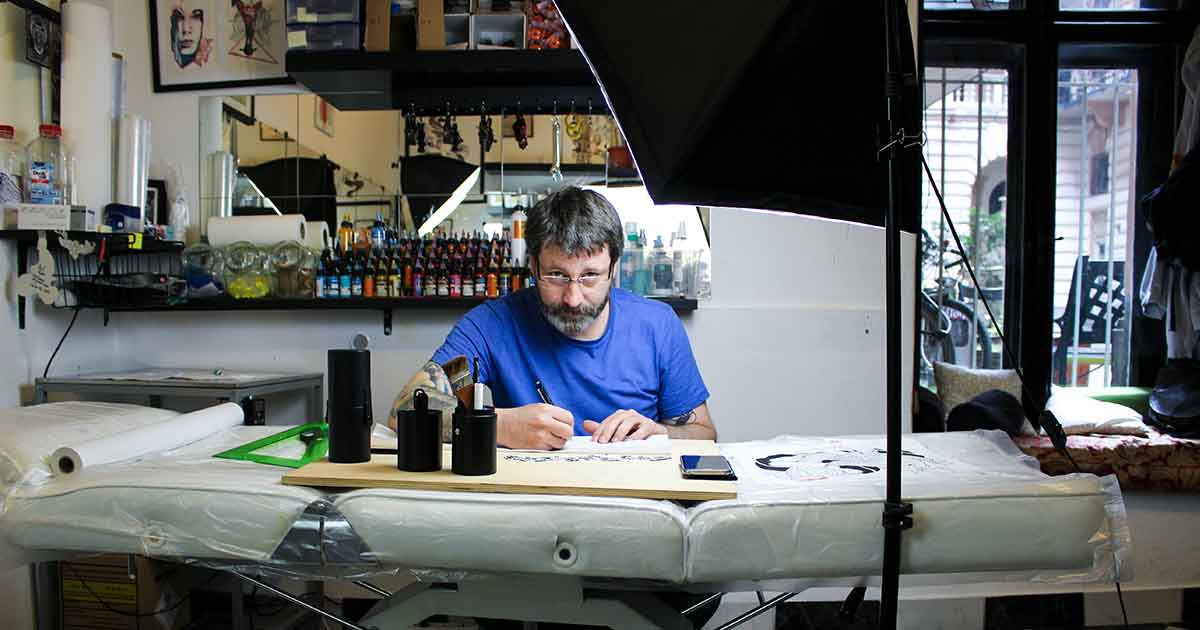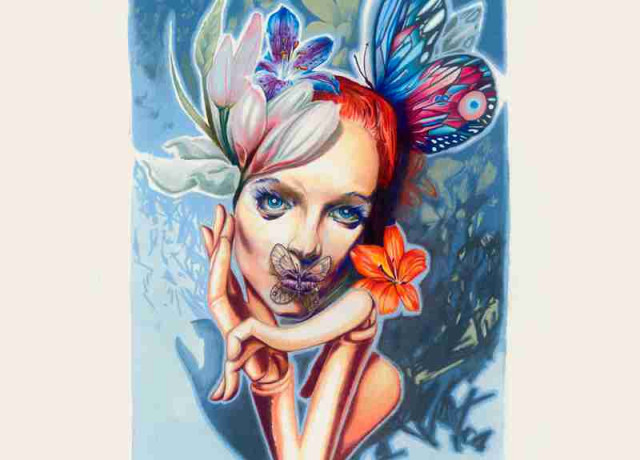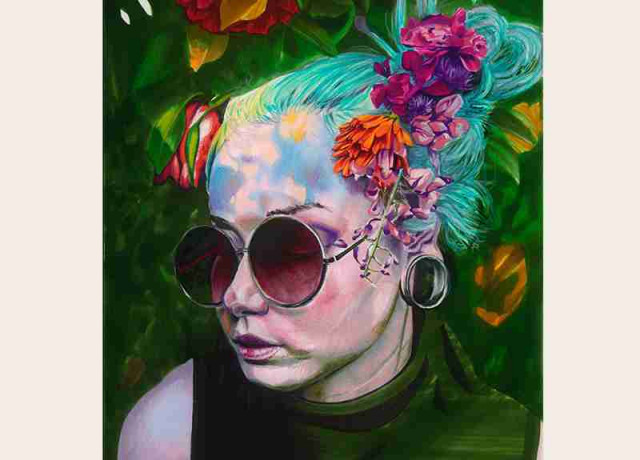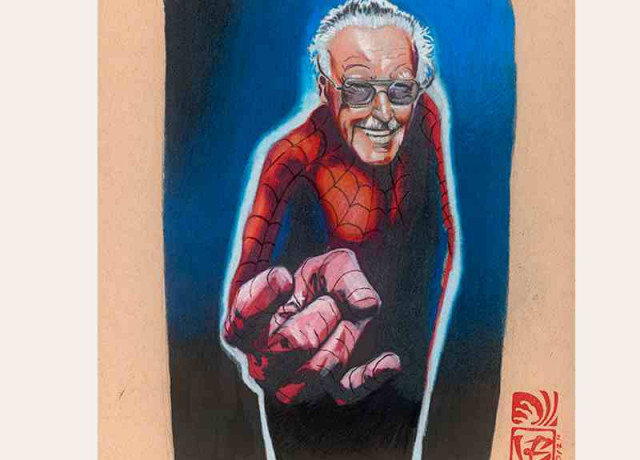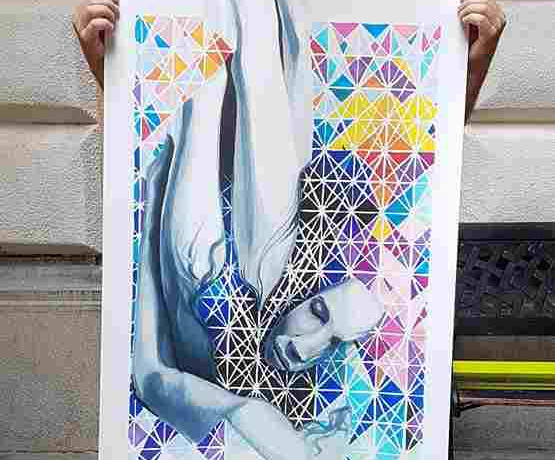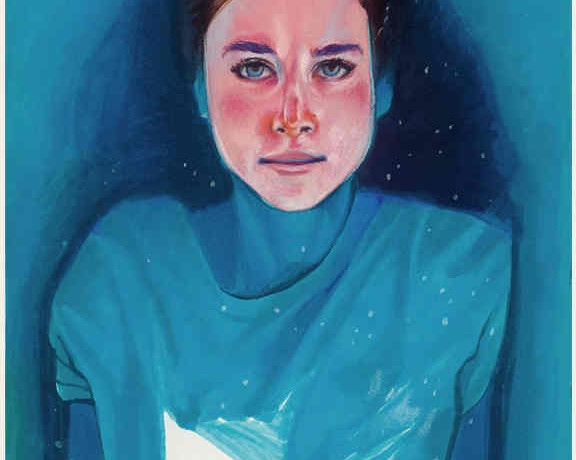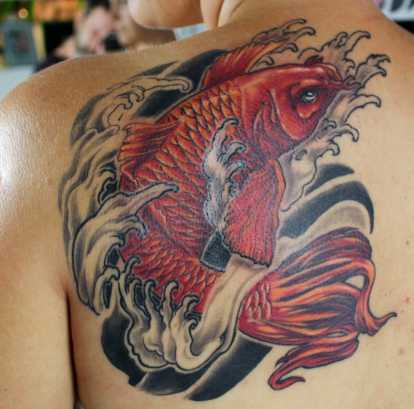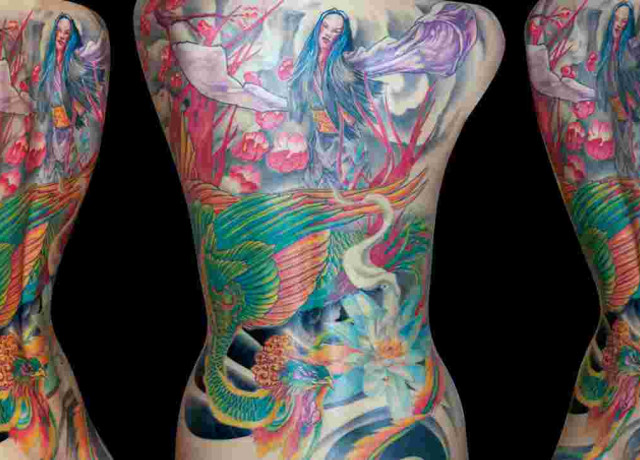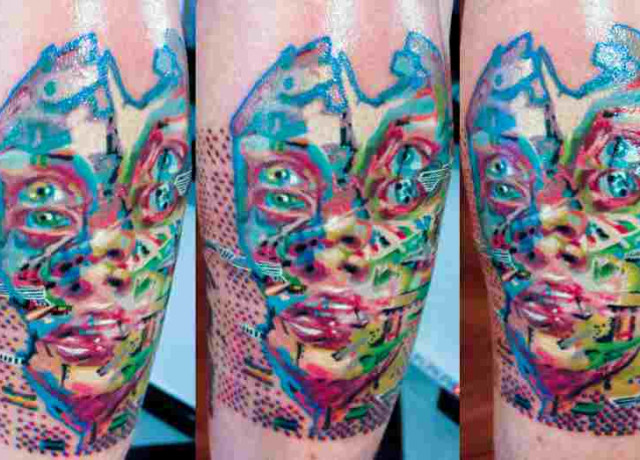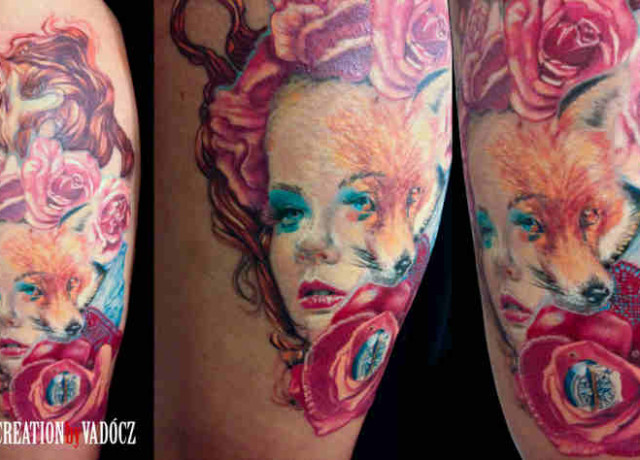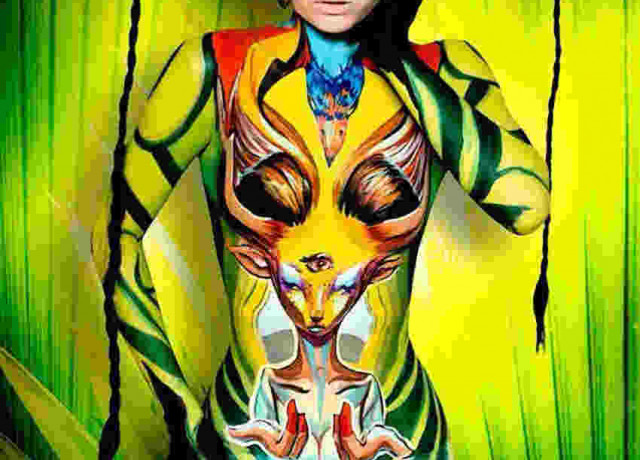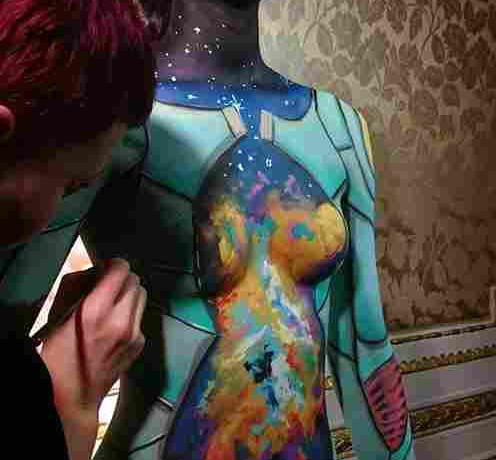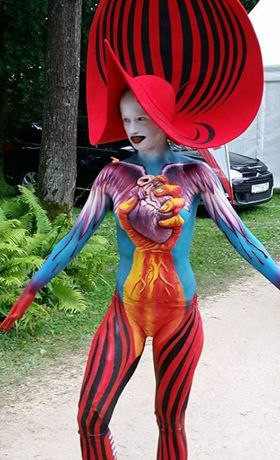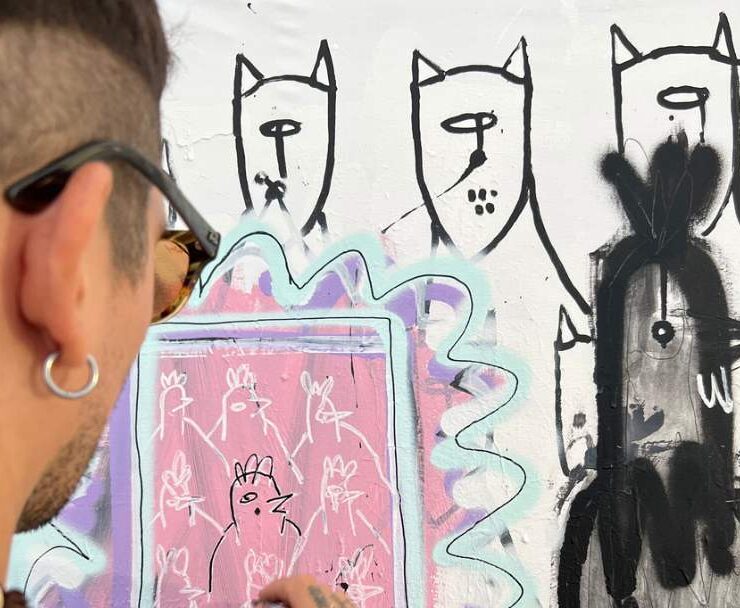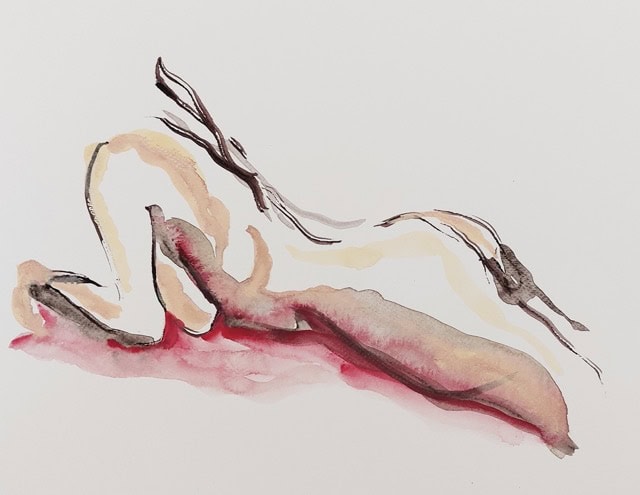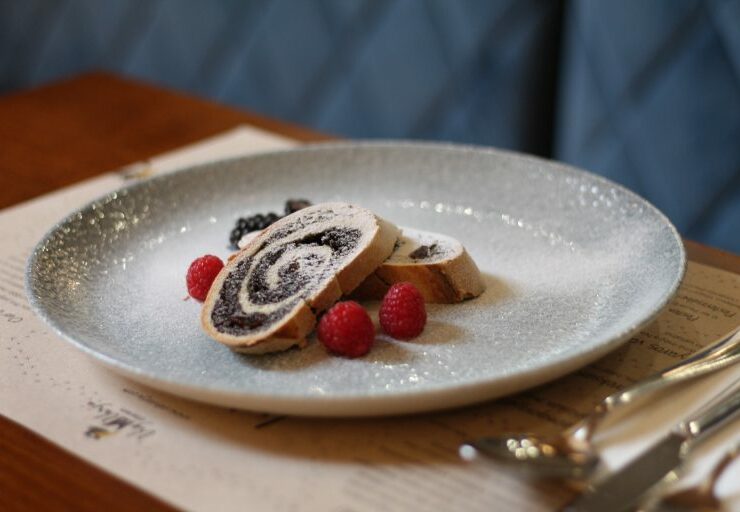If you think that tattoos are a part of some subculture, you might have to reconsider. Oscar-winning actress Judi Dench decided to have a tattoo at the age of 81 for example. Or think of Matt Taylor, the heavily tattooed leader of the Rosetta mission launched by the European Space Agency.
The purpose of our article series is not to talk anyone into having a tattoo. Rather, we would like to introduce you to the highest quality of tattoo art here in Budapest.
Our first interviewee, Balázs Vadócz, has been working as a tattoo artist for 20 years, and has won numerous international awards. He graduated as a graphic designer from the Moholy-Nagy University of Art and Design in Budapest. He wants to write his doctoral thesis on the art of tattoos. We talked with Balázs on a bench in front of his tattoo salon on Szent István körút in a wonderful 19th century courtyard decorated with frescoes by Károly Lotz.
Where do Hungarian tattoo artists stand on the global stage today?
We are relatively at the forefront, we have a good international reputation. After joining the EU, many of us went abroad to work. We have some world-renowned artists, for example Boris (in Vienna – editor’s note), James TattooArt (works in Vienna and Munich too – editor’s note), Szabolcs Oravecz (owner of Perfect Chaos Tattoo – editor’s note).
How have Hungarian tattoo artists reached the vanguard of the profession?
There were times when everybody had to be capable of doing everything in Hungary. This was typical of our generation at least, who started making tattoos in the 1990s. We grew up under such circumstances. This kind of juggling mentality brought to life a special form of creative composition.
What do you mean you had to be able to do everything? Can you stay authentic like this in a profession?
What I meant is, in terms of drawing you had to be able to use all the different techniques. There were no computers then, everything had to be done by hand, and to a high standard too. Under such pressure, professionals had to perform at a high level. The artists of today grew out of such communities, while the youngsters are just getting started.
Why did you choose tattoos as your profession?
This is very straightforward. I simply didn’t have anything to eat. I had no money; I could only buy one tomato a month, and I had to eat sugar cubes with dry bread. A friend of my girlfriend’s back then was already making tattoos. I liked drawing, and one day the idea came to me, what if I started making tattoos as well to earn some money. Then my girlfriend and I broke up. But I said tattoos were for life, and I didn’t want to mess things up. I went to Yakuza Tattoos, and they accepted me on the condition that I stayed there for 4 years. The place has closed down since then, but I still keep in touch with the people there.
What were the most important milestones of your career?
The most important milestone was when I got accepted to the University of Applied Arts. It was there that people who were important to me first said that what I do is good. I got some harsh professional criticism too of course.
Who was your most important mentor?
Gergely Füzes, the painter. He was able to connect with me in ways nobody ever could.
People above 30 rarely get accepted to the Moholy-Nagy University because, as they say, these candidates are “too set in their ways”.
I was 37, I guess. My secret was open-mindedness. By then I had been building myself up through communication with people for many years. I could adapt better to circumstances than I had anticipated. All through my university years I was expected to be primarily a tattoo artist, and only then a designer. Even though I always wanted to become a designer first, and only later a tattoo artist.
What is the difference between a designer and a tattoo artist?
Ordinary tattoo artists are bound by the visual imagery and guidelines of tattoo-making. They don’t create just using their own imagination, they implement and use existing drawings.
A bejegyzés megtekintése az Instagramon
CREATION TATTOO SHOP (@creationtattooshop) által megosztott bejegyzés
It goes without saying that you wrote your dissertation on tattoos. Is it fair to say that this was your tribute to the profession?
I have never thought of it that way. I simply had questions in me that nobody could answer. Then I formulated them again in my dissertation, but this time in statements. They could probably be answered properly in a doctoral thesis.
Are you thinking of doing a doctoral thesis?
Yes. I still have to complete a few years of university, then I will get to it.
What is the most exciting question for you?
It is always exciting to see why a customer prefers a certain pattern, and why and how this visual system was built up. When I lead them though their train of thought I ask a couple of questions. In many cases they are not even aware of the symbolism of the images they want to use.
A bejegyzés megtekintése az Instagramon
CREATION TATTOO SHOP (@creationtattooshop) által megosztott bejegyzés
Do you mean a specific type of tattoo?
No. All of them. I don’t need to dig deep into the souls of my customers. When someone steps into my salon, I immediately form an impression of them.
Isn’t this a preconception about your customer?
Technically yes. But then I sit down and talk with them openly. I build up a concept about them in my head through communication from the moment they step in until we sit down. The customer’s body language reveals a lot too. I don’t criticise their mindset or lifestyle. But I get an impression that I can incorporate into my drawings. If their ideas and mine are in harmony, then we can move forward together.
A bejegyzés megtekintése az Instagramon
CREATION TATTOO SHOP (@creationtattooshop) által megosztott bejegyzés
Some people are quite stubborn regarding their ideas.
I don’t have to come up with anything instead of them. I do nothing more than maybe fix an idea and give good advice.
Why do people have tattoos? Obviously everyone has a different motivation, but how do you see this question?
I have given this a lot of thought. Why do we wear fashionable clothes? Why do we want to cover our bodies with colours and shapes? Maybe because of the need for self-expression. I don’t like it when people refer to tattoos as a subculture. I think subculture as a term in itself can be attached to anything. It is a selective phrase, not an umbrella term.
Can you draw any conclusions from your clientele?
No. It is extremely mixed. My customers usually value beauty. If this the basis for a subculture, then yes it is. My customers vary in age too, and I don’t have a favourite type either.
Have you ever rejected anyone?
Yes. I don’t deal with anything extreme.
Do you often ask when somebody wishes to have a tattoo if they will ever regret it?
No, you won’t. Because by having a tattoo, you create a mark on the timeline of your life. If you have a clear self-image, you will also be aware that when you have a tattoo, a mark is created on your skin. Something changes, but this change happens in its natural form.
A bejegyzés megtekintése az Instagramon
CREATION TATTOO SHOP (@creationtattooshop) által megosztott bejegyzés
So we won’t ever regret it if we choose a good tattoo artist?
I don’t want to go into that, everybody has to be self-critical. At least they should. I will not take responsibility for the job of other tattoo artists. It is very important how much space you give yourself to overwrite your mistakes. We have days that aren’t as good either.
What happens then?
You stop for the day. You need to have enough self-criticism to realise this.
What kind of salons should you visit?
I think the minimum requirement is personal contact and communication. This is the point when it turns out whether a customer’s idea can be realised or not.
A bejegyzés megtekintése az Instagramon
CREATION TATTOO SHOP (@creationtattooshop) által megosztott bejegyzés
What else should you pay attention to when choosing a salon?
Hygiene is extremely important. You need to ensure there is proper cleaning and that the place is tidy enough. The placing of equipment is very revealing too. This is a very disciplined profession. The artist must have routine in what he does.
We come into this beautiful secessionist courtyard, people get comfortable in your salon, they can watch a good movie.
This is all part of the comfort. It is very important that the customer feels relaxed. A good film on TV can engage their thoughts and they can endure the process longer. I can concentrate better with music, it helps me get over difficult phases. But music is not the best for every customer.
A bejegyzés megtekintése az Instagramon
CREATION TATTOO SHOP (@creationtattooshop) által megosztott bejegyzés
You draw a lot, you are a graphic designer and design images individually for your customers. And besides, you teach as well. Is this the first such training available in Hungary?
No, there are several different schools. We devised this training programme precisely to provide proper education for people. Schools were established from a lot of money, where people graduated as “tattoo artists” in two months. I felt I could perhaps call myself a tattoo artist after only 4 years.
I don’t like stock tattoos. I value every creative moment, I’d rather spend a day with it, but I get the drawing done properly.
Tattoos are nothing new, they date back thousands of years. Are there different eras here too, just like in the history of other art forms?
We have got to the point where tattoos have essentially earned the right to be considered art. There are serious tattoo artists who only deal with creating images, and just make tattoos as a secondary activity. Today we live at the peak of the renaissance of tattoos. We are heading towards hyper-realistic imagery, and ‘isms’ have appeared in this art form as well. There are no limits.
What is the trend today?
Designer tattoos. They are very simple, made up of one or two lines only, patterns without very much background information.
What is your style?
I cannot put myself into categories. In 2006 I took part in the Milano Tattoo Convention. At that time, Milan was the stronghold of the tattoo profession in Europe. I took one of my customers with me. The image on him depicted a Japanese theme with my characteristic features. My customer went up onto the stage. All the tattoos around him were authentic tattoos with Japanese patterns. The show ended and there was no reaction.
We were a bit upset about not receiving any attention. When everybody finished at the end of the day, we were able to go behind the scenes with a friend of mine. There, the professionals practically thanked me for the experience: “Stay here in Italy”, they said, “Don’t go back home, work for me.” I got 6 job offers in one night.
So why did you stay in Hungary?
Because my daughter, Maya, was born then. She was 12 last September.
You have enjoyed some considerable international successes too. Did you prepare a lot for them?
I never really prepared for any foreign competitions, I just took my experience and expertise with me. I regularly brought home 2 or 3 awards from Stuttgart. I won a total of 4-5 awards in Germany.
Is your wife also a tattoo artist?
Edina is a professional makeup artist. She constantly tours the world with her body painting team to participate in body art competitions. She has already received first and second prizes too. She enters the special-effects category, where visual film effects dominate. She has a strange approach to the body which just blows the minds of people abroad. What they do is just so original.
We have been married since 2002. We are very proud of each other as people, as partners and artists.
Does she have a tattoo?
Yes. I did the first one, but not the second.
You work with a wide range of colours, but for certain customers you only use 2 or 3 colours. Can you step out of your comfort zone so easily?
No. In truth, those few colours are not simply composed of 2-3 shades either. I use at least 15 colours. I like to brainstorm and have new ideas when working. This is an exciting game in which giving and taking and the balance between them is very important. Having a cathartic effect is the best part of tattoos.
As a matter of fact, the drawing itself is not the complete work, the end result on the customer’s skin is.
You have two chairs in your salon. Who works on the other one?
Zsuzsa Fábri. She approached me with her drawings some time ago, which revealed immense humility towards the profession. I saw great potential for development in her. By looking at her work it became apparent to me that she could formulate any ideas with her pencil. If she is in an appropriate and inspiring environment, she can achieve anything. I didn’t look at her as a tattoo artist, but as a creator. Drawing is only the elementary level, when you have a story behind the drawing, that’s the advanced level.
Do you try to convey this kind of mentality to your students as well?
If someone wants what they are doing this shouldn’t be suppressed, it should be lifted up. I can’t stand apathy. I can see in Zsuzsa’s drawings, that she is willing to devote the necessary amount of energy to them.
How do you relax?
My profession is drawing. I am only a tattoo artist beside that. My hobby is tattoos, and my life is drawing.
What would you do, if you daughter announced that she wanted a tattoo? At what age is it advised to have your first tattoo?
I’d say nothing. Years ago I had the idea that you shouldn’t be allowed to have a tattoo under the age of 25. In my experience, many of my young customers had an idea at the age of 18, but when they got to 25 they underwent a major transition in life. Then they ask for more serious things, whilst before they only wanted to get an experience of tattoos.
I was 25 when I got my first tattoo as well. I should add that if someone at the age of 18 steps into a tattoo salon with the wrong idea, then it is the tattoo artist’s responsibility to correct these ideas. But then the question arises: what gives a tattoo artist the right to have a say in anything? Part of being an 18-year-old is to make stupid mistakes, this is how your personality develops. Youngsters in this case will have to live with their “mistakes” for plenty of years. This is what makes us who we are. We develop by understanding our earlier mistakes.

